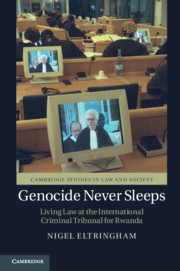Book contents
- Genocide Never Sleeps
- Cambridge Studies in Law and Society
- Genocide Never Sleeps
- Copyright page
- Contents
- Figures
- Acknowledgements
- Introduction: Judging the Crime of Crimes
- 1 ‘When We Walk Out; What Was It All About?’
- 2 ‘Watching the Fish in the Goldfish Bowl’
- 3 ‘Who the Hell Cares How Things Are Done in the Old Country’
- 4 ‘They Don’t Say What They Mean or Mean What They Say’
- 5 ‘We Are not a Truth Commission’
- Conclusion
- Bibliography
- Index
- Cambridge Studies in Law and Society
3 - ‘Who the Hell Cares How Things Are Done in the Old Country’
Published online by Cambridge University Press: 03 September 2019
- Genocide Never Sleeps
- Cambridge Studies in Law and Society
- Genocide Never Sleeps
- Copyright page
- Contents
- Figures
- Acknowledgements
- Introduction: Judging the Crime of Crimes
- 1 ‘When We Walk Out; What Was It All About?’
- 2 ‘Watching the Fish in the Goldfish Bowl’
- 3 ‘Who the Hell Cares How Things Are Done in the Old Country’
- 4 ‘They Don’t Say What They Mean or Mean What They Say’
- 5 ‘We Are not a Truth Commission’
- Conclusion
- Bibliography
- Index
- Cambridge Studies in Law and Society
Summary
A Rwandan prosecution witness is being cross-examined by an American defence lawyer. The witness has been giving testimony for eight days. The defence lawyer asks the witness whether he made notes when he gave his statement to the prosecution investigators and whether he has been consulting those notes in the evenings while he has been giving testimony. The presiding judge interjects and asks the defence lawyer to explain the relevance of this line of questioning
- Type
- Chapter
- Information
- Genocide Never SleepsLiving Law at the International Criminal Tribunal for Rwanda, pp. 84 - 117Publisher: Cambridge University PressPrint publication year: 2019

